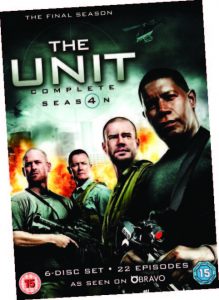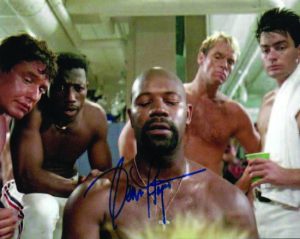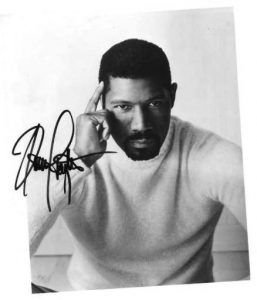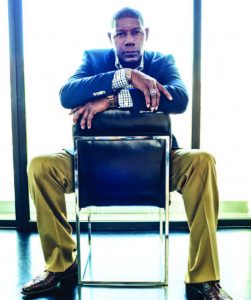The word “magnetic” is thrown around a lot in show business with little regard for what it actually means. Of the many words that have been used to describe Dennis Haysbert, it is difficult to think of a better one. Indeed, most actors labor their entire lives to achieve what seems to come so naturally to him. Add great passion, talent and commitment—along with a refreshing dose of self-awareness—and the result is a performer who knows how to command both screen and stage. EDGE Editor-at-Large Tracey Smith hoped to discover what makes Haysbert tick, and perhaps got a bit more than she bargained for. However, as their conversation shows, she was in good hands from start to finish.
EDGE: Let’s start by talking about your portrayal of authority figures. It takes more than a big body and big voice to carry it off. Who were the authority figures you modeled yourself after—who are you channeling as President of the United States in 24 or as the Allstate spokesman?

Photo courtesy of 20th Century Fox
DH: For 24, I channeled a number of presidents, and a number of individuals that were high in integrity. Some may be controversial, Tracey, but they were my choices and I still stick with them. Colin Powell was one of them; his character is beyond reproach as far as I’m concerned. I think he’s just an amazing man, who I think would’ve made an amazing president. Why didn’t that happen? I don’t know. I can speculate until the cows come home and never really find a real enough or true enough answer for that question. Jimmy Carter, another man of high integrity, was considered weak, but I fail to see what people thought was weak about him. I believe he was a gentle man. I think he was a very fair man. In the world of politics in which we live, it’s very difficult to be a really, really good man. The other is the one that they thought was the “original” first black president [laughs] and that is William Clinton. There is just something about him that is, like, “You know what? I don’t care what color you are or what gender you are, where you’ve traveled, if you are in this country, and if you are a citizen of this country or a citizen of this world—you’re going to be treated right.” That’s what I got from him.
EDGE: And Allstate?
DH: I think I got that role because I was President David Palmer on 24 and people saw me as being very trustworthy. And that’s a good reason. Because I am. And I understand that the attorneys won’t allow me to say anything that they can’t back up, so I’m pretty secure about what I’m saying to the public.
EDGE: There is a serious nature to the sales pitch in those commercials.
DH: The foundation of the campaign was built on that. I don’t really consider myself a salesman. I consider myself an advocate. And I am presenting the country with choices. And you have your right to choose. You want to follow the Gecko? Or you want to follow Flo? Or you want to follow the professor? You want to follow the camel that’s asking you what day it is [laughs] but you really don’t know what it is he’s selling? Yes, you can be entertained and be entertained…but you can also be entertained and told the truth. And that’s what I, and the company, have chosen to do. There is a reason why the other insurers are not doing what we do. It’s because we’re already doing it. So they have to find other ways.
EDGE: Which entertainers were your influences as a young man?
DH: I’ve been an athlete all of my life and I have some phenomenal athletes in my family; my brothers were incredible. So I had a lot of athletes on my wall. But I also loved movies at a very young age, and there were a lot of artists and actors that I really enjoyed. There were three of them in particular that I actually had on my wall: Brando, Olivier and my mentor now, Sidney Poitier. There were a whole lot of actors that I liked, including Montgomery Clift, Roscoe Lee Brown, Ivan Dixon and James Earl Jones, but those first three stood out to me. There were women that I really enjoyed, too, like Katharine Hepburn and Audrey Hepburn. And Cicely Tyson, Diahann Carroll. These people were blazing trails, and were coming around at a time when things were seemingly opening up for black people and for people of color in general. When Bill Cosby did I Spy, I said “What?!I Spy? Really?!” When Sidney Poitier did Brother John, a little known movie that people seldom talked about, it blew my mind that they were making movies like this. I knew what was possible. When the role of Jonas Blane came up? Oh man, I was ready to step in! Oh yes…this is what I was built for.
EDGE: How did it feel when you began pursuing this passion?
DH: When I first started to act? Oh, it felt like coming in out of the cold and being wrapped in a heated blanket. It was immediately comfortable. I would get so deep into my characters I’d get stuck in them. I realized that I had to come off of that, I had to back up. One of my instructors told me, “When you’re on stage, you are that character. You are everything you want that character to be. But five feet after you come off that stage, you have to become Dennis again.” So there was a switch I had to develop, and I just had to turn it on and off, activate and deactivate.
EDGE: What are some of the other key moments in your development as an actor?
DH: I went to the American Academy of Dramatic Arts. I wanted to be classically trained, I wanted people to take me seriously as an actor. So I guess that was one moment, attending the Academy. I guess the next moment was when I was working with John Lynne, who I thought was absolutely amazing. He is no longer with us, but his teaching is still with me…you’re making me go back to a time…it’s rather emotional for me…he was an amazing instructor and an incredibly good man.
EDGE: You worked with Ed Asner on the show Lou Grant.
DH: Ed was the consummate professional. I worked early in my career with Tom Berenger. He was at the height of his career in Major League. Another good person was Gene Hackman. And Clint Eastwood, who is a very incredible source of performance energy for me.

Photo courtesy of Upper Case Editorial
EDGE: Was there a “eureka moment” early on, when you thought Hey, I can do this?
DH: I guess when I got my first job, when I got hired for the first time. Coming from where I come from, I didn’t have any connections, I didn’t know anybody when I got into the business. I was very grateful. [laughs] I don’t think I’ve ever sat down and just said, “Man, Dennis you’re terrific.” I don’t think I have ever said that. As soon as you start thinking “you’re all that” I think you lose it. My M.O. is I perform roles the way the people actually define them in their life. When a doctor comes up to me and says, “You know what? That’s what we do,” that’s the best compliment I can get. There were some baseball players that came up to me and said, “Man! You played Cerrano like—oh, man—we love Cerrano!” If a baseball player tells me that then I must’ve done something right. When I have politicians or the President greet me and say, “I see we have the first black president here in the room,” I say, “Thank you.” When I have Ethel Kennedy tell me that I was partially responsible for Barack Obama becoming president, that humbles me, that kind of brings me to my knees a little bit. What? Really? When I play Command Sergeant Major Jonas Blane and then go to Iraq and Afghanistan to visit the troops, and they tell me, “This is the show we watch here”…I mean, you’re in a war zone and you’re doing a show about black ops and you have guys that perform those black ops say you’re doing it right— that’s a compliment for me! You’ve got to remain grounded, because what you’re doing is taking on personalities, you’re taking on characters, and you can’t have an ego about that. You can’t be outside your body looking back saying, “Boy, I didn’t do that right,” because then you’ll miss the next moment, and any actor will tell you that you have to be in the moment.

Photo courtesy of Upper Case Editorial
EDGE: On 24, did they tell you the character arc would include being president?
DH: No. That may have been their plan but it’s not something that they had divulged to me. All I was at the time was Senator David Palmer running for president in the primary.
EDGE: Did that role get you more interested or more involved in real-life politics?
DH: I aspired to…but then I got Allstate and I was working for a Fortune 500 company. I could no longer voice my opinion publicly about politics. I could donate my money, go to functions, shake hands and things like that, but I really couldn’t talk about politics. So I don’t.
EDGE: Would you ever consider running for office? Clint Eastwood, Ronald Regan, Sonny Bono…Dennis Haysbert?
DH: Maybe for a quick second. [laughs] I have a number of friends in politics in Sacramento who actually have said to me, “If you keep your nose clean, you portray a positive role—we could put you in the Senate” What? You could do what? Hmmm. I don’t think so!
EDGE: You’ve done one of the toughest things to do in film—convincingly portray a baseball player—in more than one movie. Can you handle a bat as well as it seems?
DH: Well, in all modesty, yes. All the home runs that I hit in the movie I actually hit out, but they just didn’t go as far as they shot them out. That is probably the most fun I’ve had on screen, playing baseball and getting paid for it.
EDGE: Which sports did you play in high school?
DH: I played football and ran track. I also played a little bit of basketball, but that was during our theater season, so I didn’t play a lot and I was marginally good at that. But I always loved basketball, and I loved track, I loved football, and I loved to fence, especially stage fencing.
EDGE: Your character in Far from Heaven was incredibly complex. Was that an easy role to play for you—did you have personal stuff to draw on—or did you have to dig as deep as it looked?
DH: I will say this: love is love and we really can’t choose who we love. We think we can, but you can’t pinpoint one person, and go out and say, “You know what, I’m going to love them and they’re going to love me back,” and go out and do that. I wish it were that simple. Sometimes your chemistry is such that you’re going to attract a certain person, and it has a lot to do with where you are energetically at the time, how clear you are, because sometimes you draw the wrong people towards you, and it’s incredibly hard to release them—even when you know they’re not good for you. Do you know what I mean?That’s something that hits everyone.
EDGE: What kind of response did you get to that performance?
DH: I can’t tell you how many women in their sixties came up to me with tears in their eyes and whispered to me, “That was my life”…and how my jaw dropped to the floor.
EDGE: What will we be seeing you in during 2014?
DH: I have Sin City: A Dame to Kill For, in which I reprise the role of Manute, who was played by the late Michael Clarke Duncan. I have a couple of independents coming out—The Life of a King, which is a story about an ex-con who comes out of prison and teaches chess to inner city kids, and Welcome to the Jungle, which premiered at the 2013 Newport Beach Film Festival. Welcome to the Jungle is chock full of really brilliant comedians. It was one of the few times I felt out of place in a movie, because I wasn’t a comedian. But they gave me such funny lines to say. It is also the first comedic appearance by Jean Claude Van Damme, who is actually really funny. It was a fun movie to do. This March, I have a part in Mr. Peabody and Sherman, a DreamWorks Animation comedy, which is a spinoff off of Rocky and Bullwinkle. And Think Like a Man, Too, which came out at the end of 2013.
Editor’s Note: Read more from the EDGE interview with Dennis Haysbert at edgemagonline.com!





